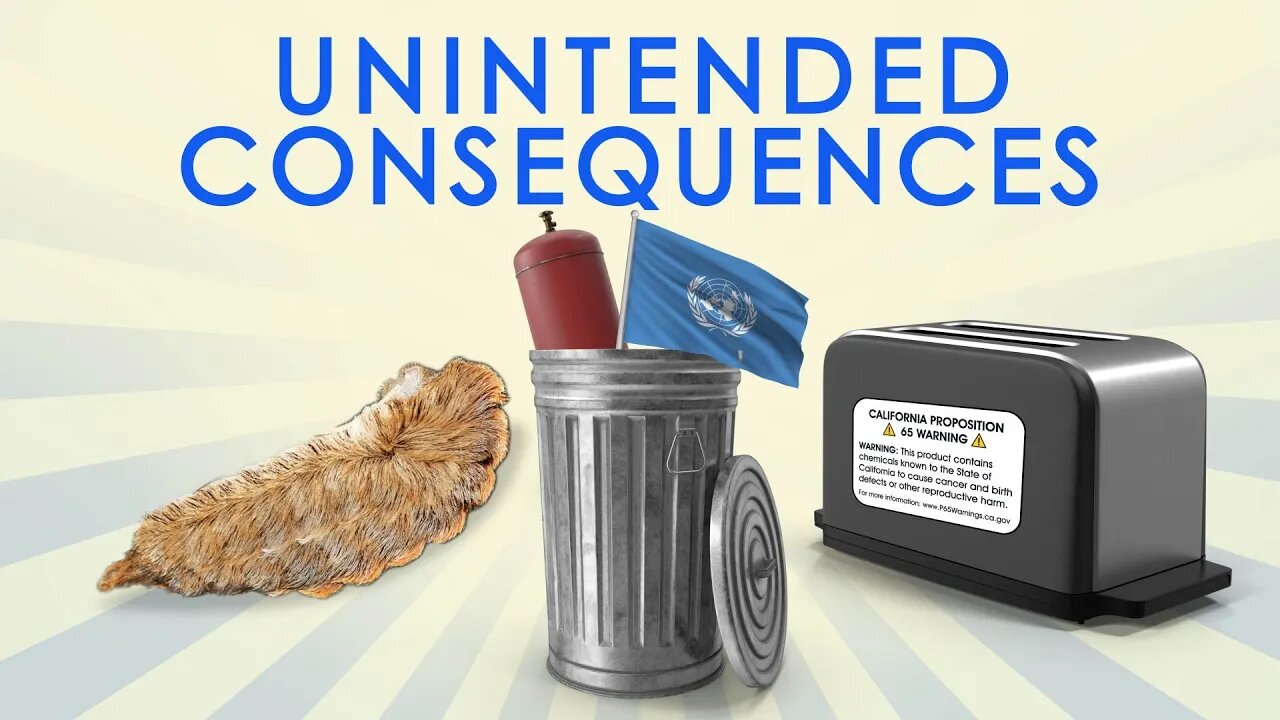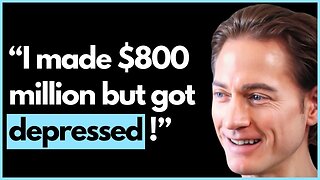Premium Only Content

Great Moments in Unintended Consequences (Vol 12)
Good intentions, bad results.
Watch the whole series: https://www.youtube.com/watch?v=1lUrH4Sbgh8&list=PLBuns9Evn1w9XhnH7vVh_7C65wJbaBECK&index=1
Do you know a great moment in unintended consequences? Leave a comment or email us at comedy@reason.com.
-----
Part One: Net Benefits
The year: 2012
The problem: Birds are congregating on the Texas Medical Center campus and doing…bird things.
The solution: Attach nets to the large oak trees on campus, forcing birds to take their business elsewhere.
Sounds like a great idea, with the best of intentions. What could possibly go wrong?
Turns out, birds eat bugs. With the birds gone, the trees became a haven for cute furry-looking critters that happen to be North America's most venomous caterpillar. Contact with these toxic misery tribbles can cause intense radiating pain, vomiting, fever, convulsions, paralysis, and even death. With nets up and apex predators gone, researchers determined the population of these comb-over pain merchants increased by a whopping 7,300 percent. Bad news for anyone, but especially a vulnerable population seeking health care at, say, oh, I don't know, a medical center campus.
You know what they say: Flock around and find out.
Part Two: Prop Comedy
The year: 1986
The problem: toxins in California!
The solution: Proposition 65! A ballot initiative that included a provision making it illegal for businesses to "expose individuals to chemicals known to cause cancer or reproductive toxicity without first giving clear and reasonable warning."
Sounds like a great idea, with the best of intentions. What could possibly go wrong?
When the warning requirements were established in 1988, 235 chemicals made the cut. Today there are over 900 compounds on the Proposition 65 list, including alcoholic drinks, Chinese-style salted fish, and wood dust. Even cocaine is on the list, so if your eight ball doesn't have a warning label, your dealer is breaking the law.
With penalties for noncompliance including fines of up to $2,500 per violation per day and overzealous litigators looking for their cut, business owners came to the rational conclusion that the cost of a label was less than the cost of litigation. The result? Warning labels everywhere regardless of the severity of risk or degree of exposure. In bars, restaurants, hotels, spas, ski resorts, schools, and Disneyland. On golf clubs, lamps, toasters, kids toys, sunglasses, potato chips, pancakes, pumpkin puree, and even trees. These signs have become so common that one study found Californians have learned simply to ignore them.
But, we don't wanna get sued either, so…
Warning: This video contains information on Prop. 65, known to the state of California to cause ambiguity between things that are dangerous and things that are harmless. For more information, go to holycrapthisisreallynotworkingoutthewaywehadplanned.ca.gov
Part Three: Cold Hard Cash
The year: 2005
The problem: Greenhouse gases are destroying the planet!
The solution: A system devised by the United Nations (U.N.) Intergovernmental Panel on Climate Change rewards companies disposing polluting gasses with carbon credits, which can later be turned into cash. The more harmful the gas being disposed, the more credits are awarded.
Sounds like a great idea, with the best of intentions. What could possibly go wrong?
Hydrofluorocarbon-23 (HFC-23), a manufacturing byproduct of the common coolant hydrochlorofluorocarbon-22 (HCFC-22), was seen as particularly harmful, allowing a large number of credits when destroyed. So manufacturers—predominantly in India and China—ramped up production of the coolant, creating more of the dangerous byproduct, which they immediately destroyed. The system netted the manufacturers tens of millions of dollars a year. Some producers made twice as much from the tax credit than from sales of the actual refrigerant.
Increased manufacturing of the coolant, itself a contributor to global warming, kept the market price competitively low, discouraging air conditioning and refrigeration companies from switching to less harmful alternatives.
When the U.N. announced a plan to stop the scheme, Chinese producers threatened to vent their huge stockpile of the gas directly into the atmosphere—what some activists labeled environmental extortion.
Nice climate you got there.
Great moments in unintended consequences: good intentions, bad results.
Do you know a great moment in unintended consequences? Email us at comedy@reason.com.
Photo credit: Carterhawk/Wikimedia
-
 51:38
51:38
ReasonTV
1 month agoScott Barry Kaufman: Incels, Narcissists, and the Victim Mindset
696 -
 27:37
27:37
pewculture
7 days agoThe I, Robot Gun Looked Cool—Until We Found Out What It Really Was - EP#23 - I, Robot
3.33K3 -
 56:00
56:00
Omar Elattar
9 months agoHow I Made $800M, Got Depressed & Now Spend $2M Per-Year On My Anti-Aging Health Routine!
7.43K -
 24:24
24:24
GritsGG
12 hours agoSpectating Random Solos with the Rank 1 Player - Pro Strategies!
3.39K -
 LIVE
LIVE
Lofi Girl
2 years agoSynthwave Radio 🌌 - beats to chill/game to
303 watching -
 9:27
9:27
MattMorseTV
2 days ago $17.85 earnedHe just lost EVERYTHING.
73.2K114 -
 7:10:39
7:10:39
MyronGainesX
1 day agoFormer Fed Explains Serial Killer Israel Keyes, Yahweh ben Yaweh, And The El Rukn Gang, And Police Shooting Reactions!
132K33 -
 4:22:33
4:22:33
Due Dissidence
13 hours agoGaza STARVATION Hits Tipping Point, Flotilla CAPTURED, Bongino BREAKS SILENCE, Maxwell MEETS DOJ,
53.5K127 -
 10:52:37
10:52:37
GritsGG
14 hours agoWin Streaking! Most Wins 3180+! 🔥
95.1K1 -
 3:01:03
3:01:03
This is the Ray Gaming
7 hours agoSunday Night LIVE | Rumble Premium Streamer
27.9K